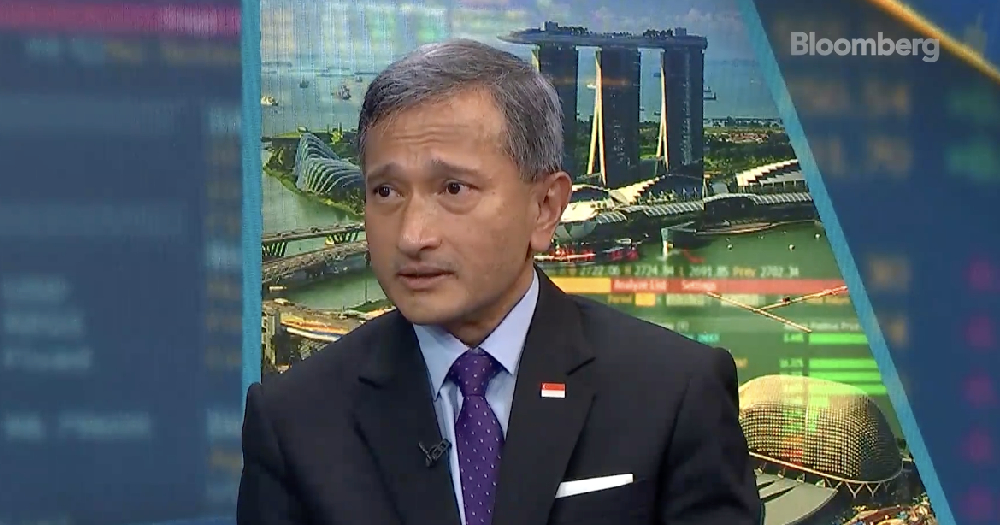Follow us on Telegram for the latest updates: https://t.me/mothershipsg
Russia's invasion of Ukraine was "egregious", disregarded "the norms of international law", and sets "a dangerous precedent", Foreign Affairs Minister Vivian Balakrishnan said in an interview with Bloomberg that was published on Wednesday, Mar. 16.
Singapore is taking a principled stand
The minister was responding to a question on the key reason behind Singapore's decision to impose sanctions on Russia.
Vivian had earlier announced on Feb. 28 in Parliament that Singapore will impose export controls on items that can be used directly as weapons in Ukraine to inflict harm or to subjugate the Ukrainians, and block certain Russian banks and financial transactions connected to Russia.
Condemning the war that Russia started with Ukraine, and reiterating Singapore's principles that guided its decision to join a growing number of nations globally to sanction Russia for its actions, Vivian said,
"The egregiousness of it all. The fact that it's such a dangerous precedent. The fact that it abrogates the norms of international law, the Charter of the United Nations. The fact that it's a big neighbour invading a smaller neighbour. The fact that it tramples over the concept of territorial integrity, of sovereignty, of independence. Even the allusion to historical mistakes and crazy decisions also rang alarm bells for us."
Hence, Vivian said that Singapore felt this is a time that Singapore has to take a stand; not because it is taking sides but because "these principles (of territorial integrity, sovereignty and independence) are existential for a tiny city-state".
The Ministry of Foreign Affairs (MFA) had revealed further details of these sanctions in a statement on Mar. 5, saying that these measures "aim to constrain Russia's capacity to conduct war against Ukraine and undermine its sovereignty".
China has "enormous influence" on Russia
When asked about how China is expected to respond, in light of reports claiming that Russia had asked China for assistance in the war -- China has denied such claims -- Vivian said that he's "not in a position to comment" because he has no information on that.
Nevertheless, he said that China has "important principles at stake", and that its economic stake in "an integrated multilateral rules-based world" is far more than even Russia. Therefore, "China will make its own decisions," he added.
He further said that China has "enormous influence on Russia politically, economically, diplomatically", and expressed his hope that Beijing could convince Moscow to cease its aggression.
"I hope they will assert their influence in the usual (way), with Chinese characteristics, which means quietly, discreetly but effectively. That's a hope. Whether this is wishful thinking on my part, we will see over the next few days and weeks," he said.
China has insisted that it is neutral towards the war between Russia and Ukraine.
However, it has refrained from condemning Russia for the invasion, and has called for Russia to "resolve the issue through negotiation". China's Foreign Minister Wang Yi has also stressed that China and Russia are each other's closest ally and strategic partner, and that the ties between them are "rock solid".
As a sign of the difficulty of its balancing act between standing by its ally and not coming off as endorsing the invasion, however, China has appeared to dissociate itself from Russia's aggression as much as possible.
For instance, it has vehemently denied that it asked Moscow to delay its invasion of Ukraine until the Winter Olympics was over, as claimed by The New York Times, citing a western intelligence report.
Ukraine shows every country needs to invest enough to defend their own interests
In addition, according to Vivian, the Ukraine example illustrated a few points for all countries to take note of.
First, a country has to stand up and be prepared to fight and "defend what is yours and your way of life and (do) whatever it takes".
Hence, he expected to see increased expenditures on defence, across the board, across the world, "because we are going into a more dangerous world".
Second, Vivian noted that problems of "global commons" such as climate change and pandemic require the following:
"It requires good sense, it requires sufficient consensus, it requires a multilateral, rules-based world, it requires access to peaceful resolution of disputes".
And that is the position that Singapore takes, he said.
"For what it is worth, little Singapore is standing up for principles and expressing a hope for the rules of engagement for this new era," he added.
Follow and listen to our podcast here
Read more:
Top image via Bloomberg
If you like what you read, follow us on Facebook, Instagram, Twitter and Telegram to get the latest updates.
